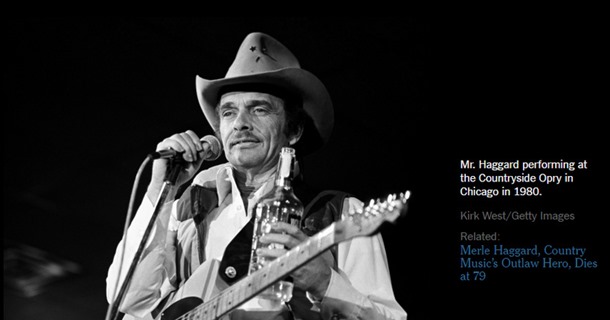The first time I ever heard the name Merle Haggard was in Norway. We had hired Wyoming Country Singer Kevin Mc.Niven and his presence in Norway attracted the attention of a Broadcasting Radio Station who wanted him in their Studio for their weekly country-music program. When he was interviewed about what he thought of Merle Haggard he gave a description which I still remember word by word.
And that pretty much sums it up for me – now and back then. Ever since, I have listened to his many songs, many of which he wrote about his own or other people’s live. Couple of years ago we drove through Oklahoma and we wanted to avoid going through Oklahoma City. So we took a smaller highway south and drove right through the town of Muskogee. The entry sign sign said something about “Home of the Okie from Muskogee”. In 2003 Mr. Haggard told the Americana music magazine No Depression “I was dumb as a rock when I wrote Okie from Muskogee, and he added, “I sing with a different intention now.”      From my personal view of the American Society I fully understand the intention behind the Okie from Muskogee as it describes the wide gap of understanding and identification between the Okie and the Hippies of that time. If Hippies were still around these days that gap would still be there. Whether Mr. Haggard wanted it or not, but the social criticism in this song survived to this day. We don’t smoke marijuana in Muskogee Merle Ronald Haggard was born on April 6, 1937, in Oildale, Calif. His first years were spent in the abandoned boxcar that his father, James, a railroad carpenter, had converted into a home for his family. James Haggard died of a stroke in 1946, after which Mr. Haggard’s mother, the former Flossie Mae Harp, a strict and pious member of the ultraconservative Church of Christ, took a bookkeeping job to provide for her three children. Chafing against his mother’s yoke, young Merle got into trouble for breaking and entering, shoplifting and passing bad checks. There were repeated trips to reform school, and escapes from it. Rebellion and escape, themes steeped more in rock ’n’ roll than in country music, would figure prominently in Mr. Haggard’s songwriting. Few would see him as part of the rock ’n’ roll tradition, but Mr. Haggard’s “fightin’ side,” as his 1970 hit put it, was a hallmark of a career that was defined as much by rock’s desire to break free of life’s constraints as it was by country music’s tendency to make peace with them. In 1957, Mr. Haggard was arrested and charged with burglary and, by his account, considered fleeing from police custody with an inmate nicknamed Rabbit. The other man proceeded with the escape without Mr. Haggard and managed to elude capture until he was caught after fatally shooting a state trooper. Convicted of murder, the man was sent to the gas chamber at San Quentin, and Mr. Haggard wrote a song for him, the death-row ballad “Sing Me Back Home.” Mr. Haggard was paroled from San Quentin in 1960. He was granted a full pardon in 1972 by Gov. Ronald Reagan of California. Mr. Haggard was already performing in public before he was sent to prison. He was just a teenager when Lefty Frizzell, his musical idol, invited him to join him onstage after hearing Mr. Haggard singing along with him from the audience. Mr. Haggard’s live has most certainly not been an easy one. He went bankrupt in 1993 and had to sell the copyrights of his songs to pay down his debts. But being the fighter he was, he continued on his way to International fame. Merle Haggard will always remain an icon of American Country Music. R.I.P. Mr.Haggard Part of this posting has been derived from: The New York Times |
Wednesday, April 6, 2016
“I was dumb as a rock when I wrote ‘Okie From Muskogee” Merle Haggard Died at ‘79
Subscribe to:
Post Comments (Atom)

I too loved listening to his music.
ReplyDeleteI liked those days of country music... not the country music of today. But most of those folks are gone now... kinda leaves Willie nearly alone.
ReplyDelete